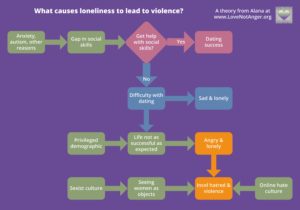You might have noticed that one of your employees, students or team members is always single and alone. Maybe you have heard their frustrations with dating, or maybe they are quiet when the rest of the team is telling stories about dating.
Tread carefully if you are a manager, supervisor, teacher, professor, coach, volunteer coordinator or other leader. The power imbalance between you and the single person may make it uncomfortable or unsafe for them to tell you what’s going on in their personal life. It’s not the same as talking to a friend.
Take your team member aside for a private conversation. Tell them why you are concerned about them, such as a pattern of behaviour you have observed. If they are feeling depressed or having other mental health difficulty, that could weaken their performance at work, school or games. Being single and lonely could be both a cause and a consequence of this, but don’t ask the person to talk about their dating and relationships. Instead, suggest that they talk to a teammate or trusted friend about their personal life. You can offer them a referral to professional counselling and our support website.
Showing your care and concern, in a non-judgmental way, could be just the thing they need to realize that life could be better. If your team member does not want support about their dating life, that’s okay too – you can go back to helping them work, learn and play at their best.
Dating requests amongst team members
Dating other employees, students, volunteers or team members is acceptable in some environments but not in others. When people join the organization, be clear about any restrictions on dating or sexual activity.
If someone is volunteering or joining your group to meet more people, let them know whether dating is appropriate in your organization’s culture. If the new person seems socially awkward, consider asking another team member to be their “buddy” and smooth their way to make social connections.
A single person might invite another team member on a date. If their invitation is accepted, and dating is okay in your environment, great! If the single person gets rejected, and takes it badly, they may leave or ask to move to another team.
If the single person asks for dates in an inappropriate way, or makes many dating requests to team members, you need to intervene. Laws and policies about sexual harassment might apply. Follow your organization’s procedures and ask the leadership for direction and assistance to support all the team members. Ensure that the single person knows that they are a human being worthy of respect, who might be desirable to someone out there, but their behaviour in your organization was unacceptable.
Handling anger
If your single employee is displaying a lot of anger at work, that creates another layer of concern: is their anger upsetting the other employees? This is a particular problem if the angry person is a man complaining or ranting about women in general, or vice versa. The hostile work environment might cause other employees to take sick leave, quit, or take legal action. You could lose customers or clients who witness the anger.
Your organization may have policies and procedures to follow as you take actions such as: telling the angry employee that their behaviour is unacceptable in the workplace, stopping and documenting that behaviour each time it happens, arranging counselling (such as an anger management class) for the angry employee, disciplining or dismissing the angry employee, and arranging support for the other employees affected (including yourself).
If you are teaching or coaching an angry single person, you have similar responsibilities to make the classroom, gym or other environment comfortable. To return to a state where everybody is respected, follow your organization’s procedures and ask the leadership for direction and assistance. If the angry person needs to be removed from your organization, ensure they know that you are not rejecting their whole self, only certain behaviours.







Pingback: How religious and community leaders can support single people – Love Not Anger